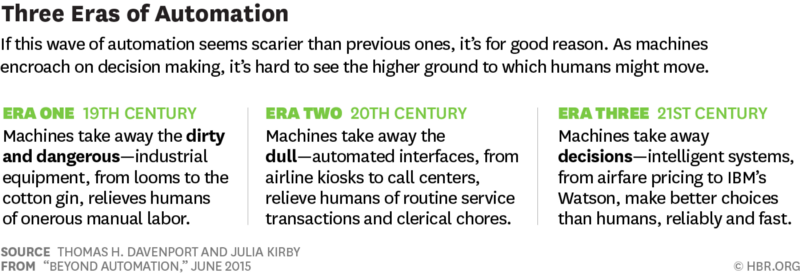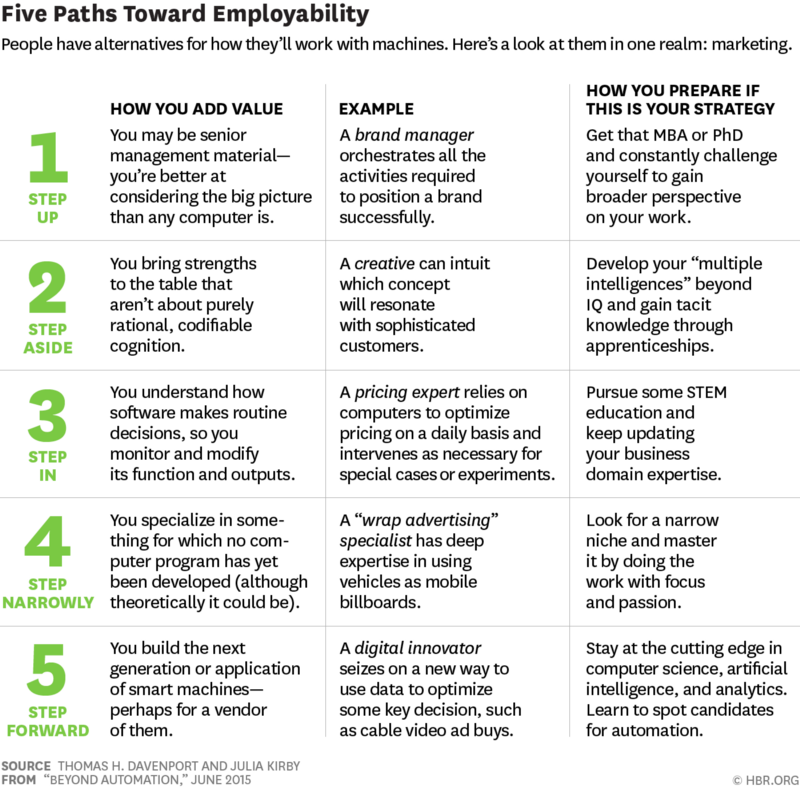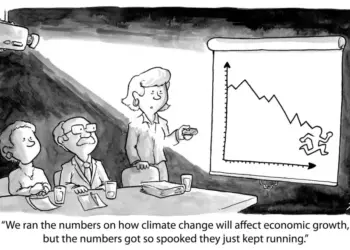Automation and Augmentation Strategies
Previously, I had started this conversation with the saying “I am not a Geek, but I need a job too…”.
Here is why: Technological anxiety (oh yes, it is a thing).
I don’t want to be a victim of the inevitable wave of “robots taking over our jobs” which is a simplistic explanation for the impact of advancements in technology in the workplace. If you think I am the only one thinking like this, listen to what Yuh-Mei Hutt, of Tallahassee, Florida, has to say (in Davenport and Kirby, 2015):
The idea that half of today’s jobs may vanish has changed my view of my children’s future.
Quincy Larson, Teacher at FreeCodeCamp (an open-source community that helps you learn to code, build pro bono projects for nonprofits, and get a job as a developer) has not stopped in his attempt to get more people coding. By consistently reminding us that the jobs we once relied upon are gone and by showing us how lucrative SW Engineering is around the world. Shall I say he has succeeded in getting a lot of people into coding and more “thinking” about it.
 Photo Credit: Medium/medium.com
Photo Credit: Medium/medium.com
See, I would not have been worried if his arguments weren’t stemming from researched work carried out by distinguished researchers such as Thomas “Tom” Davenport, Director of Research at the International Institute for Analytics, contributor to HBR, MIT Sloan Management Review, FT etcetera, and Andrew McAfee, author of, “The Second Machine Age: Work, Progress, and Prosperity in a Time of Brilliant Technologies”.
Related article: “SILICON VALLEY: WHAT IT TAKES TO DO STARTUPS”
Watch this video to get a better understanding of what I am saying.
Video Credit: CGP Grey/ youtube.com
The question is what do we do, when for most jobs “Humans Need Not Apply?”
Well, Tom D. has been gracious enough to carry out some research in that area and has provided us 5 steps to continued relevances. He is a firm believer in Augmentation → humans+machines=improved productivity. He quotes the words of David Autor, economist at MIT:
Tasks that cannot be substituted by computerization are generally complemented by it
Before we delve into them; let us take a look at the 3 eras of automation. The image below reveals how the work done by robots have shifted from just manual labour to automation of routine tasks, now creeping into more cognitive tasks such as decision-making.
 Photo Credit: Thomas H. Davenport and Julia Kirby/ hbr.org
Photo Credit: Thomas H. Davenport and Julia Kirby/ hbr.org
Davenport’s 5 Steps
Now, we know that the Robots are coming for our jobs, how do we “renegotiate our relationship” with them. Here is Davenport’s recommendation.
- Step up
- Step aside
- Step in
- Step narrowly
- (can you guess the last one?)
- Step forward
Figure 2 summarises the Five Steps and how to take them.
 Photo Credit: Thomas H. Davenport and Julia Kirby/ hbr.org
Photo Credit: Thomas H. Davenport and Julia Kirby/ hbr.org
Conclusion
Two of the suggestions (step in and step forward) postulated by Davenport are directly related to pursuing some STEM education (for which programming is a major area).
Although you don’t have to learn to code, it might as well be one of your cheapest, surest routes to surviving this wave of automation via stepping in. Compared to stepping up where you are advised to get an MBA/PhD which costs a huge sum (for instance, Cambridge’s MBA program for 2017/18 costs £51,000), you can get started with programming at next to no cost. Free platforms like freecodecamp — an open source community that helps you learn to code as well as MOOCs (Massive Open Online Courses) such as Codecademy (I used this when I wanted to learn HTML, Ruby, PHP etc). There are also paid schemes but in general, there is massive literature and resources (Udacity, Udemy, Coursera, EdX, Codeschool etc.) in the online world to get one started unto the path of coding (self-taught and even professional college degrees).
Also, platforms like Andela can help you earn while you learn the ropes to world-class software development.
However, if for some reason, you have sworn never to code, you can go the route of stepping narrowly, stepping aside or stepping up.
In summary, you don’t have to code or be techy to be relevant going forward. Just that…
- According to infoweek, salary increases of nearly 9 percent for Mobile App Developers in 2016.
- Employment of computer and information technology occupations is projected to grow 12 percent from 2014 to 2024, faster than the average for all occupations (as at 2015 projection).
- Finally, most of the jobs I have been eligible to apply for have more job openings for tech-related candidates. Especially, for an international student as me, it would be easier to get a well-paying job within some core tech capacity (such as SW development).
BONUS: Read Davenport’s full article, here.
Recommended reading: “THE BIGGEST THREAT FACING CONNECTED AUTONOMOUS VEHICLES IS CYBERSECURITY”













